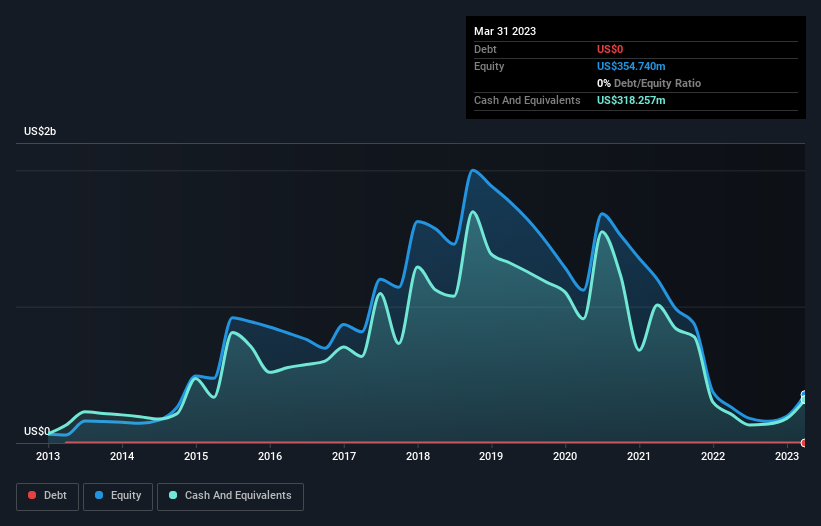- United States
- /
- Biotech
- /
- NasdaqGS:BLUE
Here's Why We're A Bit Worried About bluebird bio's (NASDAQ:BLUE) Cash Burn Situation
Just because a business does not make any money, does not mean that the stock will go down. For example, biotech and mining exploration companies often lose money for years before finding success with a new treatment or mineral discovery. But the harsh reality is that very many loss making companies burn through all their cash and go bankrupt.
So should bluebird bio (NASDAQ:BLUE) shareholders be worried about its cash burn? For the purposes of this article, cash burn is the annual rate at which an unprofitable company spends cash to fund its growth; its negative free cash flow. Let's start with an examination of the business' cash, relative to its cash burn.
Check out our latest analysis for bluebird bio
Does bluebird bio Have A Long Cash Runway?
A company's cash runway is calculated by dividing its cash hoard by its cash burn. In March 2023, bluebird bio had US$318m in cash, and was debt-free. Importantly, its cash burn was US$328m over the trailing twelve months. So it had a cash runway of approximately 12 months from March 2023. To be frank, this kind of short runway puts us on edge, as it indicates the company must reduce its cash burn significantly, or else raise cash imminently. Importantly, if we extrapolate recent cash burn trends, the cash runway would be noticeably longer. You can see how its cash balance has changed over time in the image below.

How Well Is bluebird bio Growing?
We reckon the fact that bluebird bio managed to shrink its cash burn by 43% over the last year is rather encouraging. And operating revenue was up by 2.6% too. On balance, we'd say the company is improving over time. Clearly, however, the crucial factor is whether the company will grow its business going forward. So you might want to take a peek at how much the company is expected to grow in the next few years.
How Easily Can bluebird bio Raise Cash?
Even though it seems like bluebird bio is developing its business nicely, we still like to consider how easily it could raise more money to accelerate growth. Companies can raise capital through either debt or equity. Commonly, a business will sell new shares in itself to raise cash and drive growth. We can compare a company's cash burn to its market capitalisation to get a sense for how many new shares a company would have to issue to fund one year's operations.
bluebird bio has a market capitalisation of US$388m and burnt through US$328m last year, which is 84% of the company's market value. Given just how high that expenditure is, relative to the company's market value, we think there's an elevated risk of funding distress, and we would be very nervous about holding the stock.
Is bluebird bio's Cash Burn A Worry?
Even though its cash burn relative to its market cap makes us a little nervous, we are compelled to mention that we thought bluebird bio's cash burn reduction was relatively promising. Considering all the measures mentioned in this report, we reckon that its cash burn is fairly risky, and if we held shares we'd be watching like a hawk for any deterioration. Its important for readers to be cognizant of the risks that can affect the company's operations, and we've picked out 5 warning signs for bluebird bio that investors should know when investing in the stock.
Of course, you might find a fantastic investment by looking elsewhere. So take a peek at this free list of interesting companies, and this list of stocks growth stocks (according to analyst forecasts)
New: Manage All Your Stock Portfolios in One Place
We've created the ultimate portfolio companion for stock investors, and it's free.
• Connect an unlimited number of Portfolios and see your total in one currency
• Be alerted to new Warning Signs or Risks via email or mobile
• Track the Fair Value of your stocks
Have feedback on this article? Concerned about the content? Get in touch with us directly. Alternatively, email editorial-team (at) simplywallst.com.
This article by Simply Wall St is general in nature. We provide commentary based on historical data and analyst forecasts only using an unbiased methodology and our articles are not intended to be financial advice. It does not constitute a recommendation to buy or sell any stock, and does not take account of your objectives, or your financial situation. We aim to bring you long-term focused analysis driven by fundamental data. Note that our analysis may not factor in the latest price-sensitive company announcements or qualitative material. Simply Wall St has no position in any stocks mentioned.
About NasdaqGS:BLUE
bluebird bio
A biotechnology company, researches, develops, and commercializes gene therapies for curative severe genetic diseases in the United States.
Slight and fair value.
Similar Companies
Market Insights
Community Narratives




